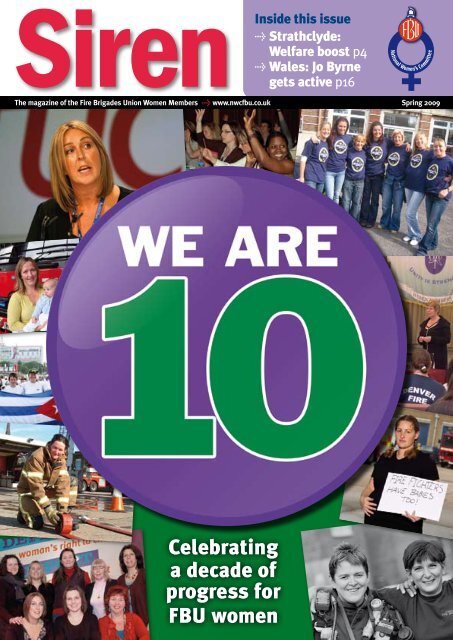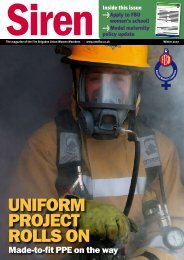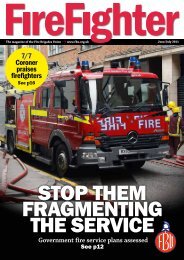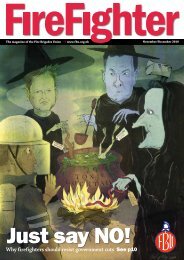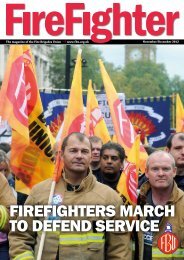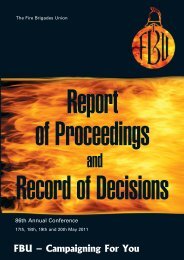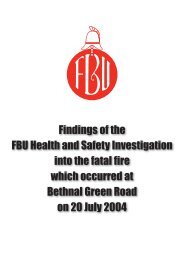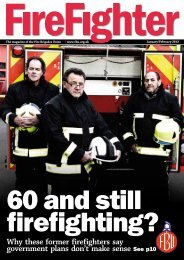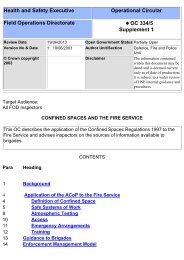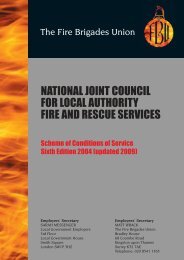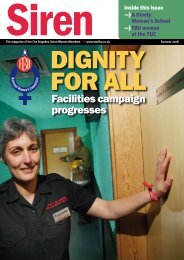FBU Siren ⢠Spring 2009 - Fire Brigades Union
FBU Siren ⢠Spring 2009 - Fire Brigades Union
FBU Siren ⢠Spring 2009 - Fire Brigades Union
- No tags were found...
You also want an ePaper? Increase the reach of your titles
YUMPU automatically turns print PDFs into web optimized ePapers that Google loves.
Inside4 Campaign newsWelfare packs forStrathclydeOnly 3% of operationalstaff are women5 Point of ViewNot pro-abortion,but pro-choice6 We are 10!Celebrating Ten Years ofthe National Women’sCommittee, including:8 ReflectionsKen Cameron, Ruth Wintersand John McGhee10 Real gains in theworkplaceWins from facilitiesand maternity rights toPPE and uniforms12 Getting OrganisedNew and long-servingNWC members onworking together forwomen members14 InternationalSolidaritySupporting sistersglobally, from Colombiaand Cuba to WesternSahara and Zimbabwe16 I’m a repJo Byrne gets busyorganising women in WalesPublished by the <strong>Fire</strong> <strong>Brigades</strong> <strong>Union</strong>,Bradley House, 68 Coombe Road,Kingston upon Thames, KT2 7AE .Tel: 020 8541 1765 Fax: 020 8546 5187Design by Edition Periodicals,www.editionperiodicals.co.ukPrinted by Blackmore Ltd,Longmead, ShaftesburyDorset SP7 8PXWomen’s School <strong>2009</strong>Last year’s women’s schoolWe are 10By the time members read <strong>Siren</strong> they will alreadyhave received an application form to attend the<strong>FBU</strong> Women’s School <strong>2009</strong>. This year, once againat Wortley Hall on April 3–5 , we will be celebrating 10years of the National Women’s Committee formally beingrecognized within the <strong>FBU</strong> structures.Students will get a premier viewing of the DVDentitled: ‘The <strong>FBU</strong> NWC – 10 years in 10 minutes”. Wealso have an international speaker attending from Cubawho will talk about the 50 years since the Cuban revolution.Mary Davis is speaking on the story of the women2 <strong>Siren</strong> <strong>Spring</strong> <strong>2009</strong>
Martin Jenkinson; Jess Hurd; Janina Struk‘The NWC has achieveda tremendous amount’The following pages reflect both the 10 year history and theinspiration for the future of the <strong>Fire</strong> <strong>Brigades</strong> <strong>Union</strong> women –organised, educated, supported and represented by women andfor women. The benefits of this are enjoyed by all members ofthe <strong>FBU</strong> as well as people in the wider labour and progressivemovement and beyond. The progress achieved has beentremendous. Unity is strength.1999■ Inauguration of the NWC■ Vicky Knight elected by committee asNational Secretary, Dona Feltham elected asNational Chair6 <strong>Siren</strong> <strong>Spring</strong> <strong>2009</strong>2000■ Resolution to NWC from London Women’sCommittee on a model policy for pregnantand new mothers. Followed through by SianGriffiths via paragraph at Annual Conference.<strong>FBU</strong> Women’s School passed a motion onmaternity policy. NWC sets up a maternityworking party. Members of NWC worked onspecific sections. First model policy draftedend 2000■ Ruth Winters, then Vice President,re-elected onto TUC Women’s Committee■ <strong>Fire</strong> kit and PPE that fits women raisedat annual conference by Sister Geri Healey2001■ Rule changes carried for NWC and B&EMMEC members. G and L Committee requestholding off on a rule change regarding their ECmember■ A model policy on facilities was calledfor at the women members’ AnnualGeneral Meeting.
Top to bottom: Women reps inworkgear; The <strong>FBU</strong> women’s school;Lucia Batibenga, a key Zimbabweantrade unionist attending our school;<strong>FBU</strong> delegation with Doctor ShathaBeserani of Iraq at TUC Women’sConferenceSee for more on 10 years of the NWCReflections of…A general secretaryWe didn’t realise how bad it was. But there was no doubtthat women weren’t being treated properly. A lot ofinstances came to light of sexual abuse, verbal abuseand so on. There were a couple of early cases – TanyaClayton and another in Soho, London – that highlighted it at first. Thefact this could happen in the fire service was horrendous. And then ofcourse there were lots of smaller instances. We had to do somethingand something quick to make sure it didn’t happen again.It upsets me that management recruit people before theybecome our members, both abusers and abused and thereforethey’ve got a responsibility. But they seemed to opt out ofresponsibility. They weren’t prepared to take it head on like we did.But when it’s your own members [who are the abusers] it’snot easy. Other unions have different ways of dealing with it.For example, in our policy we said once we had done an internalinvestigation and the person, did not have an arguable defence,we wouldn’t give them representation. Most other unions giverepresentation to both parties. A lot of pressure came from this, butalso people asked why we are doing this.This was also the background to the establishment of formaldevelopment of accountable structures for women in the <strong>FBU</strong>. Wehad no option but to do that – to get the message across that thiswasn’t acceptable.Female firefighters didn’t have a voice at the time. The adventof more and more women firefighters meant we had to find aplace where women could express themselves. There was alot of reluctance inside the <strong>Union</strong>. But people came round andunderstood what it was about, what we were trying to do.Women activists threw themselves into TUC women’s conferenceand other places with great vigour. People would come to me andsay the <strong>FBU</strong> women are fantastic at moving motions, carryingthem through, at doing this and doing that. They cut out a place forthemselves in the trade union movement. The trade union movementsat up and took notice whether on domestic or the internationalscene. The women’s committee and the policies they promotedproved to be popular, particularly on the left of the trade unionmovement and they get invited to places to speak. Because of theattitude women have taken, nobody is going to stop them speakingon any platform.The NWC has achieved a tremendous amount internally too.Hopefully men now look differently upon female firefighters andthat’s through the efforts of <strong>FBU</strong> women themselves.Ken Cameron , (<strong>FBU</strong> General Secretary 1980-2000) >2002■ Vicky Knight elected as the first EC memberfor women■ Ruth Winters elected as the first womanpresident in the <strong>FBU</strong>■ Fairness At Work statement regardingAll Different All Equal (ADAE) carried,which included the following key changes:Sections to be included on the Final AppealsCommittee; full elections to take place fornational chairs and secretaries instead ofelection via committee; motions to annualconference to be brought from sectionalAGMs.■ Vicky Knight elected onto TUC Women’sCommittee for the first time■ Women members AGM held with new rulesto enable NWC to forward 3 motions to annualconference2003■ Kerry Baigent elected as NWC Secretary■ NWC organised families and friends on thefireside – to garner support for the dispute■ First minimum facilities policy developed byNWC■ NWC carried out a survey and wrote a paperagainst changes to 2,2,3 shift system■ NWC wrote papers to assist in negotiationson the Grey Book regarding career breaks andparental leave<strong>Spring</strong> <strong>2009</strong> <strong>Siren</strong> 7
A presidentIjoined the fire service in 1980 in Lothian & Borders and at thattime there were only women in fire control. A woman who workedin the admin department wanted to become a firefighter. She wastold by the recruitment manager that she would never become afirefighter because the service would never open itself up to women.An <strong>FBU</strong> officers’ rep told me that the application forms went in thebin if they had a foreign or woman’s name. That was what equalitywas in 1980. Our brigade was the first brigade to be taken to court fordiscrimination over the sacking of a woman.Tanya Clayton’s was the most publicised story. What happened toTanya happened to numerous women across the country. We heardabout this and many other horror stories at our first women’s schools.A male official, John, who dealt with Tanya’s case, was ostracisedby a lot of his male colleagues and he got hate mail, right up until heretired. All because he stuck by Tanya. He was treated appallingly.It took the most horrific cases for senior officials to dosomething, even though the day to day bullying and harassmentcan be just as damaging.London’s ‘Women’s Action Committee’ did a lot of the pioneeringgood work to push forward the issue. And the Thematic Reviewmade a huge difference. It put the issue and the <strong>Union</strong> into the publicarena and forced even the most resistant officials in the <strong>Union</strong> to dosomething about it.Men in the <strong>Union</strong>, good, bad and indifferent all felt they couldrepresent everybody and understand what was happening toeverybody and anybody. That’s not the real world. Women cameforward and said we are happy to represent women, we are happy togo forward and assist and do what we can: a woman’s voice puttingforward a woman’s point of view. And it was the same for the blackand gay and lesbian sections. Thanks to the leadership at the time– Ken Cameron, Ronnie Scott and some Executive Council members –working with <strong>FBU</strong> women, it happened.There is an assumption made a lot of the time that women in thewomen’s section are not involved in the <strong>Union</strong> in general, but womenimmerse themselves in the <strong>FBU</strong> totally. Why would a woman in the<strong>FBU</strong> women’s section be any less a trade unionist than a male <strong>FBU</strong>member? We are trade unionists first. Butif you walk in the room, it’s pretty obviousthat you are a woman. And people treatyou differently because of that.But women in the <strong>FBU</strong>, although few innumber, are actually more involved thanmen, as officials at branch, brigade andhigher levels in the <strong>Union</strong> because of theirinvolvement in the women’s section.Ruth Winters, <strong>FBU</strong> President 2002-2007Above: circa 1998 (left to right)Ronnie Scott (President), MikeSmith (Executive Council member);Alan Totterdale (National Officer);Philippa Clark (head of research; MickHarper (Vice President); Ken Cameron(General Secretary)Right: Jenny Impey20-odd years agoA Member-turned-RepIstarted in the London <strong>Fire</strong> Service 24 years ago. But I only gotactively involved with the union two years ago, after moving toKent. I then finally realised just how much women had achieved inLondon and how I hadn’t appreciated it.There were 12 of us when I joined. There had been very fewwomen firefighters before then. We were known as “<strong>Fire</strong> Women”.I still have a helmet that says “FW Craig” – my maiden name. WACwas very active, but I was absolutely determined not to get involved.People used to try and get me to go to meetings, but I was veryconformist and very stubborn.I’d screw up invitations from WAC and throw them in the bin. Ithought getting involved would damage my relationship with mywatch.When I moved to Kent it was a real eye-opener. I was posted toCanterbury with an induction course in Maidstone.They weren’t used to forthright women and I rattled a few cageswhen I spoke out about lack of facilities. It got even worse at thestation in Canterbury. The women’s locker room was a hot sweatboxof a cupboard, there was no sanitary vending machine, women’suniforms didn’t fit properly and the maternity pay was pathetic. Isoon found out I was pregnant with my second child. I was very angrythat I was pregnant in Kent where nothing was being done about lowmaternity pay, unlike in London. I now realised, women had foughtfor improvements. By not getting involved I’d been cutting off mynose to spite my face. I went for a vacancy for a Region 11 women’srep publicised in <strong>Siren</strong> and became actively involved from then on.After my second child was born, I was eventually diagnosed withpost-natal depression. I was off work for a while and the brigade werefantastic. I asked for a secondment as women’s rep, and have been2004■ NWC brought first resolutions to AnnualConference■ NWC redrafted maternity policy to updateit. Used in the negotiations at NJC to improveconditions for members■ ADAE policy altered to afford interimrepresentation■ Radiation policy developed by NWC■ Mission statement for NWC produced■ NWC stand alone website set up2005■ <strong>FBU</strong> Childcare resolution passed at AnnualConference – reasonable re-imbursementpolicy introduced■ Call for the maternity policy to bere-launched with brigade officials. New glossypolicy circulated to all officials to assist withnegotiations2006■ Childcare motion pursued at TUC Women’sConference.■ NWC developed a strong campaign againstshift changes – press releases, flyers etc■ NWC meets <strong>Fire</strong> Minister, starts workingtowards a survey of women firefighters■ Women’s-fit mannequin introduced by FRSafter years of NWC campaigning8 <strong>Fire</strong>Fighter <strong>Siren</strong> <strong>Spring</strong> Month <strong>2009</strong>2006
in the workplaceat regional and brigade level. Following this,Staffordshire <strong>FBU</strong> took a resolution on theissue of returning to work after maternityleave to <strong>FBU</strong> annual conference, providingan opportunity for us to speak at conferenceabout the policy. Many NWC reps andlocal officials have helped with negotiationsaround the country. Although enhancedpay hasn’t always been secured, the otherelements of the policy often have, which hashelped a great number of women at workwhen they become pregnant.PPE and uniformAs far back as the first Women’s School in1992, the fight for better personal protectiveequipment (PPE), uniform and a femaleform mannequin were debated. The NWCpursued the issue locally and at numerousnational forums, at annual conference andat every opportunity with <strong>FBU</strong> brigadecommittees. And with the support of ourlocal officials, we have had some success.The first national female mannequin fortesting of fire kit came in the form of Sophietwo years ago and although it will be a fewyears until we have historical data which canbe used, it is a start.ShiftsChanges in shift patterns are often proposedby management as family friendly workingand the promotion of women into the FRS.This is not only a cover for a cuts agenda,but a tactic to divide the <strong>FBU</strong> membership.The NWC has campaigned with vigouragainst proposed changes on this basis.We have campaigned using surveys of ourmembers and through the pages of <strong>Siren</strong> and<strong>Fire</strong>fighter, by organising local meetings ofwomen members, lobbying fire authoritymembers and uniting members at brigadecommittees.ChildcareIn 2003, the <strong>FBU</strong> women’s committeelaunched a campaign for better fundingfor childcare in order to allow members toparticipate better in the <strong>FBU</strong>. We produced areport for the <strong>FBU</strong> National Treasurer. Thisled to a childcare policy, but we believed itdidn’t fully address the issue of re-imbursement.So the NWC took a resolution toAnnual Conference which called for the<strong>FBU</strong> to fully reimburse all reasonable costsincurred by reps and members using a recognisedchildminder while undertaking <strong>FBU</strong>business and activities. It was overwhelminglysupported. Today’s <strong>FBU</strong> policy is veryprogressive and it is something for which weare very proud. We also took the campaignfor improved childcare provision to theWTUC and the TUC with some success.Abortion RightsThe NWC has pursued the campaign fora woman’s right to choose for a numberof years. We first raised abortion rightsas an issue at annual conference in 2004,when the new campaign ‘Abortion Rights’came into being following the merger oftwo organisations. We called on branchesto affiliate to support the campaign thatAbortion Rights was leading in order toremove some of the restrictions that wereand are still currently imposed on womenfrom the 1967 abortion act. A woman’sright to choose has been the subject ofmuch debate at our AGM’s over the yearsand we have had guest speakers fromAbortion Rights attend our school. Manymembers of the NWC have attendedlobbies and debates in Parliament and wehave written and spokenon several motions onabortion rights at theWTUC and the TUC.The NWC is affiliatedto Abortion Rights asare many RegionalWomen’s Committeesand we have thereforeattended their AGM over the years. Thisyear’s AGM was attended by Jenny Impey(Region 11 rep), see page 4.Women’s movementThe NWC has a proud history of linkswith other women’s organisations, butin particular with the National Assemblyof Women (NAW) and the Charter forWomen. The NAW has been aroundfor many years and is a very informedpolitical and feminist organisation withthe most inspirational women within it.The <strong>FBU</strong> members who have attended themeetings have learnt so much.We have been involved with The Charterfor Women since its inception. We areproud of the politics of the charter asit serves to refocus and campaign forwomen and our rights, which are toooften ignored in society, the workplaceand the labour movement.We have also played an important rolein the Women’s TUC, advancing issues ofimportance to women here and abroad.This has all been vital to our progressionas trade unionists and as feminists.Without input from other women, wewould have a very narrow view ofissues that affect women. But we alsohave something to offer the movementtoo. <strong>FBU</strong> women work in a very maledominated field and this gives us aparticular insight that we can share withother women in other industries.
jess hurdSee for more on10 years of the NWCThe National Women’sCommittee – officially tenyears old this year – ispunching well above itsweight. But the NWC hasflourished not throughstrong-arm tactics, but byconsistently supporting,encouraging and nurturingwomen. It has focussedrelentlessly on getting abetter deal for women <strong>FBU</strong>members – from maternityleave to decent showersSlowly, over the years, the NationalWomen’s Committee (NWC)has built up credibility bothwithin the union and the widertrade union movement. Evenemployers, now faced with targets to improvedramatically the number of women they mustrecruit, are starting to pay attention to theorganised voice of women in the fire service.Right now, the NWC’s reputation isarguably higher now than at any time in itshistory. The national committee has spawnedregional committees and brigade reps. AsDona Feltham, chair since the start, put it:“We’ve come a long way. More women areparticipating in regions and brigades becausethey can see we get things done.”The committee’s achievements, andits welcoming, inclusive approach to thewomen it seeks to serve, are certainly worthcelebrating. It says a lot that 35 childrenattended last year‘s oversubscribed women‘sschool – so their mothers didn‘t have to missout. A brief look at what some committeemembers are up to gives a glimpse into howcanny campaigning and skilful negotiation ispaying dividends for <strong>FBU</strong> women.Pioneering womenIt’s worth reminding readers that the NWCwas formally launched ten years ago after agroup of women activists in London formedthe Women’s Action Committee, which,while – or some would argue because – it didnot have the easiest of relationships with theunion’s hierarchy, was home to some spiritedwomen who pioneered the fight for genderequality in the service.WAC was an inspiration for the fledglingNWC and strong links remain: Sally Harper,(From left to right top to bottom)National Women’s Committeemembers Julie Small, DonaFeltham, Staci Leach, Sam Rye,Vicky Knight, Emma Davis, KerryBaigent, Denise Christie, SianGriffiths, Helen Harrison, JennyImpey, Sally Harper. See JoByrne on page 16.organpregnant if they want to and seeing off thethreat of unisex facilities at some new buildstations. Sam knows how to organise. “It’sabout getting out and about, getting yourface known, organising meetings, gettinginto brigades. It’s been a battle at times toget managers to treat women reps seriously,but we’re getting there. It’s been a long andslow journey. But employers are beginningto realise that if they are going to hit governmenttargets on recruiting women they aregoing to have to listen”.She has also benefited from NWCnetworking. When she was after non seethroughwhite shirts for women in Durham,Denise Christie NWC rep for Scotland senther down a sample already procured forwomen on her patch. “It was my easiest win,”says Sam.Four years ago, Denise didn’t have anytime for the NWC. “I thought sections inunions were divisive. So if you had a problemas a woman in the <strong>Union</strong>, just go and seeyour brigade official. But I was very naive. Iwas on a good watch in a progressive brigade,never had any problems and automaticallyassumed no-one else had. So we didn’t reallyneed this women’s section.” She went to thenext women’s school to argue her case. “I washorrified to hear what some women had hadto go through, overwhelmed by the support,dedication and enthusiasm of the womenthere and decided to get involved.”Which is actually a bit of an understate-Gettingenergetic secretary of WAC, now representsthe London region on the NWC. OtherLondon women who have moved brigadesand gone on to be regional reps say theyonly appreciated the gains WAC had madefor women once they left London. Sam Ryeadmits to being taken aback by the lack ofwomen’s organisation when she moved to theNorth East eight years ago.“While London was at the forefront, itwas very different up here. I wasn‘t reallythat involved in London, but only realisedthe gains that had been fought for once Imoved,” said Sam, who found herself NWCmember for a region with four brigadesand no women’s reps. County Durham,Cleveland and Northumberland now havereps – leaving just big-hitting Tyne and Wearwithout. There have been a good few “wins”in the region – including arguing the case forsome women to stay on shift when they areIt’s about getting out andabout, getting your face known,organising meetings, gettinginto brigades. It’s been a battleat times to get managers totreat women reps seriously,but we’re getting there.12 <strong>Siren</strong> <strong>Spring</strong> <strong>2009</strong>
10 years of NWCisedservice. “I like to empower people ratherthan just do things for them”, says Helen,who has just clinched a 39-weeks-at- full paymaternity deal in her home brigade.Jo Byrne has been on full-time secondmentsince last summer organising women inWales. She’s hosted women’s meetings “awayfrom the station if possible so women aren’tput off by peer pressure”, taken up localconcerns and gone on union courses. “It’sbeen a steep learning curve, but I’m reallyenjoying it,” says Jo, who led the union’s delegationat the Wales TUC women’s conference.She finds the three-monthly NWCmeetings invigorating and educative. “Youthink you’re on your own. When we meet,you know you‘re not.”Emma Davis, former branch chair inCambridge, has been a regional women’s repfor East Anglia for three years. She’s aboutto return to work after having her first baby.When pregnant, she even negotiated her ownmutually beneficial flexible working deal andeven tried out different maternity wear forthe brigade.Emma has supported women across theregion in grievances – including for indirectsex discrimination – and hasn’t yet lost acase. She feels she’s doing something “reallypositive, trying to help women have a bettercareer in the fire service.” Emma is keen onoutreach. “We have a good core of activewomen members but it would be good to seemore getting involved at branch meetingsThe success of the NWC mustbe good for the whole union.Some who get involved aswomen reps go on to take onmore roles within the unionment. Denise, an Edinburgh firefighter, hasbeen organising women in Scotland for thepast two years, helped by the women repsnow in place in five of the region’s eightbrigades. She‘s also involved in the ScottishTUC. The union’s many recent equality winsin Scotland include an end to mixed overnightrest areas in Grampian and separateshowers and locker rooms across Lothianand Borders. Denise’s advice to other organisers?“Get all members, male and female,behind you. Get them campaigning. Getthem writing letters, coming to meetings.Invite fire board members. Get the women’svoices heard. It makes a difference.”Helen “my middle name’s persistence”Harrison is based in Staffordshire and hasrepresented the West Midlands from thestart, when it wasn’t that easy for womento stick their heads above the parapet. She’ssupported women facing bullying or harassment,helped new mothers clinch flexibleworking arrangements and made sure there’sa welcome for young women joining theand having their say.” As branch chair sherepresented men too.Strengthening the <strong>Union</strong>The success of the NWC – there is now a nearfull compliment of regional reps and reps arejoining every week – must be good for thewhole union. Women are meeting regularly,and some who get involved as women repsmay well go on to take on more roles withinthe union, and, like Emma, use their negotiatingskills to help male as well as femalecolleagues. Indeed, the NWC’s evidencebasedbest practice reports – from maternityto facilities – are essential toolkits for unionnegotiators.The NWC, organised, encouragedand tirelessly supported day to day by itsSecretary, Kerry Baigent is thriving.Says Kerry: “For one reason or anothermany women find it very difficult to raisetheir issues at branch meetings or with localreps. The NWC provides a vehicle for womento do just that. Thanks to the incredible hardwork of members of the committee, pastand present, we have been progressing ourmembers issues with vigour.”Women at last got their own executivemember in 2002, when Vicky Knight – anNWC founder member and feisty equalitycampaigner – was elected. She makes surethe authentic voice of <strong>FBU</strong> women is heardat the highest level of the union. And at thisyear’s conference, the NWC will, for the firsttime, be able to submit emergency motionsand amendments. Progress indeed.Says Vicky: “<strong>FBU</strong> women, throughthe National Women’s Committee andthe voice they argued for and won in the<strong>Union</strong> at a national level, have made a hugeimpact. They have changed the fire andrescue service, injecting skills, diversity andincreasing representation of the public weserve. And they have been a driving force inimproving welfare for all <strong>FBU</strong> members. Forthat we should be very proud.”thanksThe many women who helped to bring us tothe point at 1999, where the <strong>FBU</strong> recognisedthe NWC within its formal structures,including CSNC members Ruth Winters, ValSalmon, Linda Shanahan and Sue Offland,London women Ghada Razuki, Linda Smith,Adele Phemister and Sian Griffiths.Women in the wider movement who spenttime talking to the Executive Council aboutequality issues, such as Terry Marsland,Barbara Switzer, Megan Dobney and MaryDavis.Philippa Clark, <strong>FBU</strong> head researcher,who provided our fledgling committee withmassive amounts of superb advice andsupport.And finally all progressive men in the<strong>Union</strong> and wider movement.
See for more on 10 years of the NWCdifferLooking back over more than a decade of women organising women can be very proud.within the <strong>FBU</strong>, internationalism has played a pivotal role We are few and we have limited resources. But we do not considerin how we integrate with and relate to workers globally. that ‘doing nothing’ is an option. Through determination and effectiveThe links we have made have ensured that we have been organisation we have and can continue to make a difference.able to count on the support and knowledge of our sisters Of course, there is still so much to do. And so we remain asworldwide and returned that support and mobilised when called upon committed as ever to highlight, inform, forge links and most importantly,with all our ability fight against violence, injustice and humanin the name of progress.Many of the causes the NWC has championed – issues affecting the rights violations, wherever they occur.lives of many women across the globe – would not have been highlightedor even begun to be addressed without us. And for that <strong>FBU</strong> tenHere we chart some key international solidarity work over the lastyears.Making aCuba2000/2001: links were secured anddeveloped with the FMC (Federacionde mujeras cubanas, or the CubanWomen’s <strong>Union</strong>), alongside ongoingwork with the Cuba SolidarityCampaign. Alicia Gonzales, FMCwomen’s officer, attended our nationalwomen’s school in what would turnout to be the first of four visits fromour good sister. Alicia’s visit wasdoubly important as it allowedour Cuban sisters to get access tolarge numbers of unions directly:that year we secured a speakingcommitment from the platformat TUC Women’s conferencein Scarborough, providingthe trade union movementwith an insight into theprogress made by womenunder the revolution butalso the impact of the decades longUS economic embargo on Cuba onCuban women, from a Cuban woman;and Alicia and her Cuban colleaguesalso took the opportunity to attendpolitical meetings, meet women’sorganisations and make other links.We have since moved motions at <strong>FBU</strong>conference, TUC women’s conferenceand TUC congress in support of ourCuban comrades, and in May2008, Scotland women’s rep,Denise Christie visited Cubaon an <strong>FBU</strong> delegation.10 years on, the NWC in <strong>2009</strong>will, on the occasion ofthe 50th anniversaryyear of the Cubanrevolution, returnto the FMC asa focus for ourschool.Colombia2002: trade unionist-turnedSenator Gloria Ramirez, visited theannual National Women’s School,giving us an understanding of thedangers of fighting for workers’rights in what is still the mostdangerous place in the worldto be a trade unionist. We thenmoved motions at <strong>FBU</strong> and TUCconferences in support of actionfor Colombia. Our then president, Ruth Winters met withher and women activists on a TUC delegation to Colombia’scapital Bogota, visiting women’s prisons and upon herreturn helped publicise the horrendous conditions andfictitious crimes for which these women were incarceratedOur support continues with our affiliation to Justicefor Colombia, and securing a platform speech for ourColombian sister Gloria at the TUC Women’s conference.This was the first time that a motion regarding women inColombia had been passed at the TUC women’s conferenceand it widened the debate and raised awareness.jess hurd/reuters/empicsCaption hereCaption hereCaption herePalestine2002: Vera Baboun from the Universityof Bethlehem spoke at a NWC meetingto give us an update on the horrendoussituation in Palestine – a situationwhich has worsened over the years tothe slaughter in Gaza today.2003: The <strong>FBU</strong>’s Ghada Razukiand Linda Smith attended the <strong>FBU</strong>women’s school, recounting theharrowing events from their visit toPalestine.<strong>FBU</strong> women subsequently organisedlocal meetings and galvanised theirbranches and <strong>FBU</strong> women’s structuresto affiliate to Palestine SolidarityCampaign.These initiatives helped <strong>FBU</strong>women communicate the issue atforums beyond the <strong>Union</strong>, such asthe TUC women’s conference and TUCCongress, increasing awareness of theneeds of Palestinian workers and theirfamilies.14 <strong>Siren</strong> <strong>Spring</strong> <strong>2009</strong>
GLOBAL SOLIDARITYenceWestern Sahara2005: the NWC provided essential support to the Sandblastcampaign against the Moroccan occupation of the WesternSahara, the last colony of Africa. General secretary of theSaharawi women’s union Fatima Mehdi gave our women’sschool a first hand account of life in the Saharawi campsfor Saharawi women and their families. <strong>FBU</strong> women alsolobbied their MPs to pressure Government to take actionagainst human rights abuses and a just settlement for theSaharawi people.Kurds2006: Sohila Naseri from the Kurdish Women’s Associationspoke at our women’s school, highlighting discriminationand other issues facing our sisters in Iraq, Kurdistan andSyria. The NWC continues to provide support.Zimbabwe2007: The Dignity Period campaignwas our focus, with sister LuciaBatibenga, a key Zimbabwean tradeunionist attending our annual women’sschool. The school students madea fantastic collection towards thesupply of dignified sanitary provisionsfor women in Zimbabwe. <strong>FBU</strong> sistersthen ensured that the NWC, and the<strong>FBU</strong> at a national, regional, brigadeand branch level: affiliated to thecampaign; lobbied their MPs to signtwo Early Day Motions on Zimbabwe;and put motions forward to both<strong>FBU</strong> conference and TUC women’sconference to support this campaign.Successful efforts were then madefor the TUC’s General Council to securea Zimbabwean woman speaker toCongress that year: Tabitha Khumaloof the Zimbabwe TUC (since elected tothe MDC) was given a live, televisedplatform and the full support ofthe TUC. This further embarrassedPresident Robert Mugabe’s regime.The <strong>FBU</strong> maintains the link with ZTUCand ACTSA, in particular those sisterswho bravely exposed to the world theinjustices that are being experienced.Afghanistan2006: <strong>FBU</strong> women tabled a motion regarding the plightof women in Afghanistan to TUC Women’s Conference.Supported unanimously, it called for the TUC and affiliatesto get involved with women’s issues there and to supportthe association of Afghan women, RAWA. The TUCinternational department has since highlighted the issueand the work of local women’s NGOs among TUC affiliates.Iraq2008: Existing <strong>FBU</strong> links with Iraq were bolstered bymaking contact with the Iraqi Women’s League (IWL)and a representative of the organisation, Dr ShathaBeserani, spoke to <strong>FBU</strong> sisters at the women’s schoolabout the harrowing impact of the war, the situationfor women and children, in particular in Basra andwhat we, as British trade unionists can do to assistin rebuilding an infrastructure and a future forwomen and children, including education of boys and girls amongst theruins of their towns and cities.The school that year collected £570 for Shatha, which the IWL will use towardsthe re-building of a library and schoolroom in Basra town on her return. This is justone example of real people making a real difference with just some information,awareness and a will to do something. Be sure that links with the IWL willcontinue. <strong>FBU</strong> branches, brigades and regions have since affiliated and the TUCwomen’s committee also remains in contact.<strong>Spring</strong> <strong>2009</strong> <strong>Siren</strong> 15


